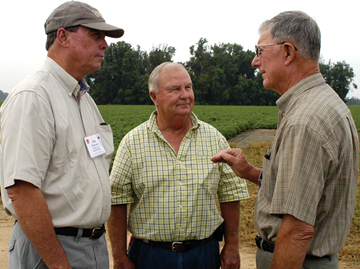Commodity Producers Conference Offers Hope, New Ideas

Just as they did in 2006, the farmers attending the 35th annual Commodity Producers Conference in Mobile on Aug. 9-11, found hope amid a worsening drought and plenty of ideas to take back home.”As a farmer, it’s real easy to get lost in your farm and your business and lose perspective,” said Pickens County farmer Mike Dee. “Being here, it makes you optimistic to see where it has rained, and it’s a chance to get new ideas about how other farmers operate. If you get one idea that you can take back and make your business more profitable, it justifies the whole trip.” The three-day conference, designed to help farmers improve the profitability of their own operations, drew about 700 people from across Alabama to the Mobile Bay region where they attended educational seminars and workshops, received updates on the farm bill and toured farming operations of all kinds.The conference opened Thursday night with a banquet where new Auburn University President Jay Gogue urged the audience to arm themselves with facts so they can dispel common myths of agriculture.”You often hear people — bright people, educated people, community leaders — say that agriculture is something that we used to do, not something that we do today but something that we used to do,” Gogue said. “All of you know those kind of statements are not accurate, but I would encourage you to become armed with facts that you can use in these discussions.”In keeping with this message, Federation President Jerry A. Newby recognized longtime Montgomery County Federation member and Ag In The Classroom Chairman Jane Alice Lee and Freddie Patterson, director of the Federation’s Department of Governmental Affairs, for their efforts to bring the Ag in the Classroom program to Alabama school children.Friday was devoted entirely to tours as buses headed out on six different routes — one focusing primarily on horticulture operations, one on aquaculture, one on row crops and one on dairy and beef operations. Another tour focused on wildlife and the eco-system along the Mobile-Tensaw Delta, and still another included a visit to Bellingrath Gardens.”Nobody does it the same. Everybody has a unique operation,” said Dennis Smith, president of the Coffee County Farmers Federation, who took the Orange Tour on stops to Driskell Farms, Seward Farms, Reeves West Bay Peanuts and Tom Dodd Nurseries. “The crop tours are always good. You can learn how a piece of equipment works by talking to the farmer who uses it in the field — these are things the manufacturer won’t always tell you.”Saturday morning was filled with seminars, such as one on Auburn University’s farm-related bioenergy projects, including how this fall, Auburn will unveil a portable gasification rig capable of providing electricity and heat for a standard poultry house using wood chips and poultry litter.State Treasurer Kay Ivey told how Alabama’s Linked Deposits program can be a new source for agricultural funds, and Secretary of State Beth Chapman answered many questions regarding the new UCC lienholder program. Commissioner Ron Sparks of the Alabama Department of Agriculture and Industries also dropped in to give an update on the latest efforts to bring drought relief to Alabama farmers.Ron Gaskill, director of congressional relations for the American Farm Bureau Federation, emphasized the importance of agricultural exports during a discussion on international trade.He noted that since 1970 U.S. agricultural production has outpaced domestic demand, and the gap is widening. Today, 25 percent of farm cash receipts come from exports, and some commodities, like cattle, are as much as 70 percent dependent on foreign markets. Farm labor — and the many rules regulating it — was the topic of AgWorks, Inc.’s Dan Bremer, who told farmers that failing to stay abreast of the rules for using migrant workers could result in hefty fines. Bremer also said foreign workers will be a part of American agriculture one way or another. “You are farm owners. Are you going to tell your children that they have to be hand-harvest laborers? Who’s going to do it?” Bremer asked. “It’s going to be a foreign worker, either in this country or in their country, and we’re 10 days away from being hungry.”Dr. Charles Mitchell, Extension agronomist with Auburn University, took his audience on a historical tour of Alabama agriculture through a slide presentation that packed the house. James Wallner, legislative assistant for Sen. Jeff Sessions, said farmers could see an extension of the current Farm Bill if the Senate doesn’t act quickly to pass its version of the bill. Committee markup of the Senate version is expected to begin in September with consideration by the full Senate not expected until October or November. If passed, that bill would then go to a conference committee with the recently House-passed version. Given that timeline, Wallner said he would not be surprised to see an extension of current law.Both Wallner and Tara Smith, also a director of congressional relations for the AFBF, praised the work of Alabama’s congressional delegation and Federation lobbyists for preserving the safety net for farmers in the House-passed farm bill. They called the preservation of a separate payment limitation for peanuts a “major victory,” and were hopeful a new emphasis on renewable fuels would bode well for the Southeast.”The only place we have to grow these crops is in the Southeast,” Wallner said.In a separate session, Betty Wolanyk, director of education and research for the American Farm Bureau Federation, led the group in an interactive exercise during which she dispelled many myths about agriculture. n
